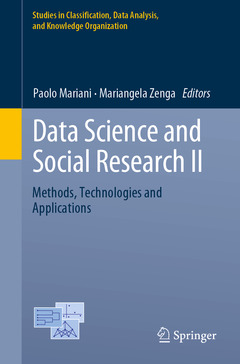Chapter 1 - Digital methods and the evolution of the epistemology of social sciences (Enrica Amaturo, Biagio Aragona).- Chapter 2 - Restricted Cumulative Correspondence Analysis (Pietro Amenta, Antonello D’Ambra, Luigi D’Ambra).- Chapter 3 - Determining the importance of hotel services by using transitivity thresholds (Pietro Amenta, Antonio Lucadamo, Gabriella Marcarelli).- Chapter 4 - Staging cancer through text mining of pathology records (Pietro Belloni, Giovanna Boccuzzo, Stefano Guzzinati, Irene Italiano, Carlo R. Rossi, Massimo Rugge, Manuel Zorzi).- Chapter 5 - Predicting the risk of gambling activities in adolescence: a case study (Laura Benedan, Gianna Serafina Monti).- Chapter 6 - Municipal managers in Italy: Skills, training requirements and related criti-cal aspects (Mario Bolzan, Giovanna Boccuzzo, Marco Marozzi).- Chapter 7 -Attitudes towards immigrant inclusion: a look at the spatial disparities across European countries (Riccardo Borgoni, Antonella Carcagni, AlessandraMichelangeli, Federica Zaccagnini).- Chapter 8 - A bibliometric study of the global research activity in sustainability and its dimensions ( Rosanna Cataldo, Maria Gabriella Grassia, Carlo Natale Lauro, Marina Marino, Viktoriya Voytsekhovska).- Chapter 9 -Big Data Marketing: A Strategic Alliance (Federica Codignola).- Chapter 10 -Data processing in a Healthcare National System (with the analysis of the Italian HNS) (Manlio d’Agostino Panebianco, Anna Capoluongo).- Chapter 11 - Smart Tourism System in Calabria (Annarita De Maio, Daniele Ferone, Elisabetta Fersini, Enza Messina, Francesco Santoro, Antonio Violi).- Chapter 12 - Spatial Localization of Visitors Mobile Phones in a Sardinian Destinations’ Network (Anna Maria Fiori, Ilaria Foroni).- Chapter 13 - The role of Open Data in healthcare research (Carlotta Galeone, Rossella Bonzi, Paolo Mariani).- Chapter 14 -Social epidemiology: the challenges and opportunities of worldwide data consortia ( Carlotta Galeone, Rossella Bonzi, Federica Turati, Claudio Pelucchi, Matteo Rota, Carlo La Vecchia).- Chapter 15 -Identification of Opinion Makers on Twitter ( Svitlana Galeshchuk, Ju Qiu).- Chapter 16 - Modelling Human Intelligence using Mixed Model Approach ( Thanigaivasan Gokul, Mamandur Rangasamy Srinivasan, Michele Gallo).- Chapter 17 - An analysis of the impact of requirements on wages within sectors of the tourism industry ( Paolo Mariani, Andrea Marletta, Lucio Masserini, Mariangela Zenga).- Chapter 18 - Big Data and Economic Analysis: the Challenge of a Harmonised Database (Caterina Marini, Vittorio Nicolardi).- Chapter 19 -ROC Curve in GAMLSS as prediction tool for Big Data (Andrea Marletta).- Chapter 20 - Social media in disasters. Big data issues in public communication field (Francesco Marrazzo, Gabriella Punziano).- Chapter 21 - Divorce in Italy: a textual analysis of cassation judgment ( Rocco Mazza, Rosanna Cataldo, Maria Gabriella Grassia, Marina Marino, Vincenzo Pastena, Emma Zavarrone).- Chapter 22 - A Bayesian mixture model for ecotoxicological risk assessment ( Sonia Migliorati, Gianna Serafina Monti).- Chapter 23 - Virtual Encounter Simulations: A New Methodology For Generating Conflict Data (Georg P. Mueller).- Chapter 24 - Is Public Service Motivation-Performance relationship mediated by other factors? ( Raffaela Palma, Anna Crisci, Luigi D’Ambra).- Chapter 25 - A Classification Algorithm to Recognize Fake News Websites ( Giuseppe Pernagallo, Benedetto Torrisi, Davide Bennato).- Chapter 26 - A comparative analysis of the university student mobility flows among European countries (Marialuisa Restaino, Ilaria Primerano, Maria Prosperina Vitale).- Chapter 27 - A Preference Index Design for Big Data ( Venera Tomaselli, Giulio Giacomo Cantone).- Chapter 28 - Construction of an immigrant integration composite indicator through the Partial Least Squares Structural Equation Model K-Means (Venera Tomaselli, Mario Fordellone, Maurizio Vichi).- Chapter 29 - Facebook debate on Sea Watch 3 case: detecting offensive language through Automatic Topic Mining Techniques ( Alice Tontodimamma, Emiliano del Gobbo, Vanessa Russo, Annalina Sarra, Lara Fontanella).- Chapter 30 - Martini’s index and Total Factor Productivity calculation( Biancamaria Zavanella, Daniele Pirotta).




